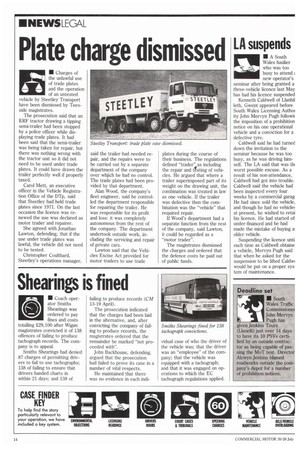Plate charge dismissed
Page 16

If you've noticed an error in this article please click here to report it so we can fix it.
• Charges of the unlawful use of trade plates and the operation of an untested vehicle by Steetley Transport have been dismissed by Teesside magistrates.
The prosecution said that an EU tractor drawing a tipping semi-trailer had been stopped by a police officer while displaying trade plates. It had been said that the semi-trailer was being taken for repair, but there was nothing wrong with the tractor unit so it did not need to be used under trade plates. It could have drawn the trailer perfectly well if properly taxed.
Carol Mett, an executive officer in the Vehicle Registration Office of the DTp, said that Steetley had held trade plates since 1971. On the last occasion the licence was renewed the use was declared as motor trader and repairer.
She agreed with Jonathan Lawton, defending, that if the use under trade plates was lawful, the vehicle did not need to be tested.
Christopher Coulthard, Steetley's operations manager, said the trailer had needed repair, and the repairs were to be carried out by a separate department of the company over whjich he had no control. The trade plates had been provided by that department.
Alan Wood, the company's fleet engineer, said he controlled the department responsible for repairing the trailer. He was responsible for its profit and loss: it was completely autonomous from the rest of the company. The department undertook outside work, including the servicing and repair of private cars.
Lawton said that the Vehicles Excise Act provided for motor traders to use trade plates during the course of their business. The regulations defined "trader',' as including the repair and asting of vehicles. He argued that where a trailer superimposed part of its weight on the drawing unit, the combination was treated in law as one vehicle. If the trailer was defective then the combination was the "vehicle" that required repair.
If Wood's department had a separate function from the rest of the company, said Lawton, it could be regarded as a "motor trader".
The magistrates dismissed the charges and ordered that the defence costs be paid out of public funds.








































































































































